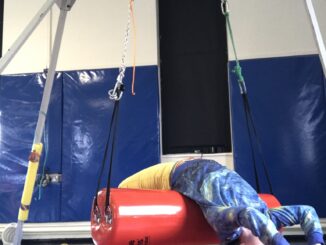One skill that has been really helping me in these past few weeks has been the skill of being able to describe to myself in my head, in detail, what feels bodily wrong when things feel wrong.
This is a relatively new skill for me. For the majority of my life, if I felt bad, it was a relatively nebulous “bad”. I’ve written before about the copious crying I did in childhood — it was always the comment my teachers had on all report cards — and about my growing into self-awareness of things like hunger, hygiene and self-care, etc at a later time than is typically expected of people.
Similarly, I’ve come to the ability to parse “feeling bad” into anything specific later in life. I had very bad seasonal allergies/hayfever as a kid, but I wouldn’t notice until my eyes were swollen basically shut and somebody commented on it; if I took drowsy medication for the aforementioned allergies, I would be lethargic and falling asleep but be unaware of it until someone pointed it out. That’s just one example of how internally, I didn’t have a great connection between my body sensations and any kind of description of them, let alone interpretation of them.
This process I’m describing is called interoception!
In the past few years I have gotten better at interoception. And in the past few weeks, while recovering from knee surgery, it’s been a really invaluable skill to practice.
One example is sleep. Sleep has been ongoingly the hardest thing for me. For the first couple of nights, residual anesthesia and pain meds meant I was knocked out quick. But after that, I had to deal with the fact that my entire body and brain were completely exhausted, yet I could not get my leg to be comfortable.
For the first few days of that, that’s as far as my brain got. “I’m not comfortable! I’m not! I’m just not! Nothing is comfortable! Aaaaaaaah!”
Then, after a little while, I was able to get my brain to settle down enough to be able to explore in more specific words what was actually wrong.
My sleep was basically 100% different from my normal, so the short answer was “everything”. But after teasing out more specifics:
-I’m cold: a blanket felt too heavy and hurt my knee so I was sleeping with a sheet and no fan, where I usually sleep with a fan and like 4 blankets. The sheet wasn’t warm enough.
-I don’t have any deep pressure: because a sheet is too lightweight, so it wouldn’t hurt my knee, but that left me feeling weightless and not at all cozy and bundled up like I wanted to feel.
With these in mind, I switched my tactics. I put a sheet over my whole body, then a blanket over my non-injured leg, and another blanket over my torso and arms, leaving only my injured leg with only a sheet on it. Okay, warmth acquired and deep pressure acquired — not for all of me, but for some of me! What else?
-I’m not “tucked in” on the leg side: I like feeling like my blanket wraps all the way around me. But I was using a pillow as a blockade to keep my injured leg in position, and it meant that my blanket was loose on that side, not tightly tucked in.
So, I tucked the sheet around me and put the pillow on top of the sheet, instead of beneath it with my leg. What else?
-I don’t know what to do with my arms: I usually sleep on my side, with my arms curled up beneath my chin and holding a stuffed cat that’s exactly the right size. Now, lying on my back, my arms didn’t know where to go.
So, I got a second stuffed animal so I could curl one arm up out to my right and one out to my left, or rotate just part of my torso while keeping my legs still and hug whichever animal was on whichever side.
Okay, so the truth is: despite all of this, sleeping is still really difficult. It feels like every night or even multiple times a night there’s something new uncomfortable that I have to troubleshoot, and I can’t rely on the solutions from the day before.
But, it’s really good practice for me to figure out listening to all the parts of my body when my brain wants to freak out. Is the discomfort from my actual knee, the surgery site, or is it something else? Is my foot uncomfortable, my hips, my torso? Is there too much of some sensory input, or too little, or something different than what I’m used to?
It’s also good practice at not invalidating myself. Weirdly, one of my biggest complaints stopping me from being able to sleep with a fully straight leg (like the doctor would prefer) isn’t pain in my knee, but in my heel for some reason. The first few days I tried to argue with myself that that didn’t make any sense and I needed to power through it, before I accepted that I don’t have to know the reason to be willing to listen to myself. Nobody is going to come into my bedroom and validate what part of me hurts, and also nobody is lining up to tell me that I’m making it up. I just have to tell myself and listen to myself!



